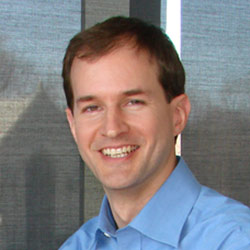Presenting Science and Technology Through the Arts
ETOPiA brings the Northwestern community to an opera exploring Alan Turing’s life, death, and legacy

Considered the father of computer science, Alan Turing was instrumental in breaking German naval ciphers coded by the Enigma machine, enabling critical Allied victories during World War II. After the war, Turing was charged with “gross indecency” for acknowledging a homosexual relationship and was subjected to chemical castration in lieu of serving time in prison. Turing died of cyanide poisoning at age 41.
A hero and tragedy befitting an opera, the Chicago Opera Theater (COT) presented the world premiere of composer Justine F. Chen and librettist David Simpatico’s The Life and Death(s) of Alan Turing at the Harris Theater for Music and Dance on March 23 and 25.

Through the generous support of several sponsors, Northwestern Engineering students received free tickets to the performances, and faculty and staff had the opportunity to purchase heavily discounted, subsidized tickets. The ETOPiA organizing committee acknowledges the benefaction of the Barry and Mary Ann MacLean Fund for Art and Engineering, the Chicago Opera Theater, the James F. and Mary L. Gibbons Art and Technology Fund at Northwestern, Northwestern Engineering’s Office of the Dean, Northwestern University’s International Institute for Nanotechnology, and Northwestern University’s Materials Research Science and Engineering Center (NU-MRSEC).
Patty Sekirka, NU-MRSEC project coordinator, also brought a group of students from the Chicago Public Schools and City Colleges of Chicago to the opera.
Grayson, professor of electrical and computer engineering, founded ETOPiA in 2008. The program fits into Northwestern Engineering’s Whole-Brain Engineering philosophy by linking artistic expression with technical ideas and seeking to inspire cross-disciplinary dialogue about the roles of science and technology in society.

Lihui Yi, a PhD student in electrical engineering advised by Wei, played a crucial role in organizing the ETOPiA event and coordinating with the staff of the COT and Harris Theater.
“Arts and cultural events reveal the beauty and diversity of nature and the human experience,” Yi said. “They are not just entertainment, they really inspire me to promote understanding, challenge my thoughts, and explore new ideas. These events provide me with an opportunity to step outside of my own experience and immerse myself into others.”
Presenting science and technology through arts and performance has proven to have a profound outreach effect, capturing the imagination of diverse audiences and inspiring the next generation of scientists and engineers. By merging these seemingly disparate disciplines, we not only break down barriers but also create an inclusive platform for people of all backgrounds to engage with complex subjects, sparking curiosity and fostering a greater appreciation for the wonders of our world.
Ermin WeiAssistant Professor of Electrical and Computer Engineering and Industrial Engineering & Management Sciences
Exploring Turing through opera
Originally commissioned by the American Lyric Theater to celebrate the centennial of Turing’s birth in 2012, The Life and Death(s) of Alan Turing is a semi-biographical and sci-fi infused retelling of Turing’s life and an exploration of the various theories surrounding his death. COT produced an acclaimed workshop performance of the opera in 2019.

Jason Hartline, professor of computer science at Northwestern Engineering, attended the March 23 performance and hosted a talkback with the audience during the intermission. Lev Reyzin, professor of mathematics, statistics, and computer science at the University of Illinois Chicago (UIC), led an audience discussion on March 25. Reyzin is the UIC site director of the Institute for Data, Econometrics, Algorithms, and Learning (IDEAL).
“I'm thrilled that so many Northwestern students saw our opera, and I’m especially honored by the scientific community coming out to support us,” Simpatico said. “Opera takes a personal moment and can amplify it to a universal level. The personal becomes the mythic, and the mythic becomes the personal through the use of music and time. The sonorofic nature of the medium finds sympathetic resonance in our flesh, in our bones, in our blood, and our guts and speaks to us in a language beyond language.”

More than just science
ETOPiA events highlight the pursuit and application of knowledge by individuals, like Turing, whose historical and personal circumstances span from tragic to epic. Grayson, Khalili, and Wei aim to generate awareness among students about the interdependence of the different fields of study, and the services, responsibilities, and obligations of engineers and scientists.

Previous ETOPiA productions include Science Under a Pandemic (performed via Zoom), The Bit Player, Copenhagen, Manya: A Living History of Marie Curie, QED, A Number, The How and the Why, The Agony and Ecstasy of Steve Jobs, Grounded, A Life of Galileo, and Mill Girls.
Grayson noted that ETOPiA is just one example of the intersection between art and science that can be found at Northwestern. “The Heart’s Knowledge,” an exhibition featuring the art of Dario Robleto inspired by his experience as Northwestern Engineering artist-at-large, is now open at the Block Museum of Art.
“Northwestern Engineering recognizes that creativity is the soul of an engineer and dialogue is the heart,” Grayson said. “Inspiration for the next great design comes from creative dialogue with other like-minded artists.”
The Heart’s Knowledge
“The Heart’s Knowledge: Science and Empathy in the Art of Dario Robleto” is currently on display through July 9 at the Mary and Leigh Block Museum of Art.